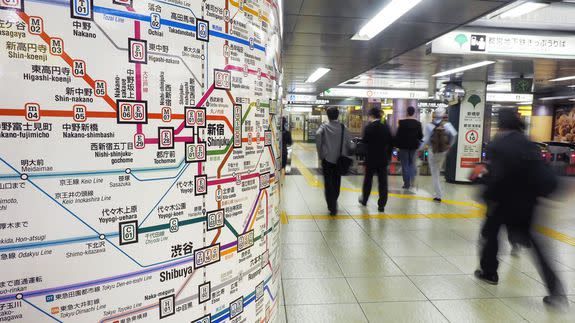Apple is planning tap-to-pay for iPhones on trains in Japan

Apple's march to be the way people pay for everything continues, with rumoured plans to allow people in Japan to tap their iPhones on buses and trains there.
According to Bloomberg, Apple intends to include Sony's Felica RFID contactless chip in a future version of the iPhone.
Japan's de facto mobile wallet, Osaifu-Keitai, is powered by Felica, and works across the country's public transportation modes, as well as in convenience stores and fast food outlets.
SEE ALSO: Android Pay launches in Asia starting with Singapore
Japan's system started 10 years before Apple Pay was announced in 2014, and is so well-established that when Apple Pay came on the scene, the response in Japan was meh. People there were more concerned that iPhones wouldn't work with the 1.9 million Osaifu-Keitai readers around the country.
Here's a Japanese user paying at Starbucks by tapping his phone:
Apple's decision to work with Sony is good news for the many iPhone users in Japan. Apple had 41 percent market share of Japan's mobile phones in 2015 — although this proportion has been slipping in recent years.
Obviously, most other Japanese phones popular in the market such as Sony's and Sharp's already include Felica support. Korean giant Samsung partnered with Sony to include Felica in its handsets back in 2012.
Payment via Felica and other similar RFID chips is a little different from Apple Pay, which routes payments through banks. The latter is understood to be slower, because authorisation needs to go through several steps, through the banks' systems and over payment players like MasterCard and Visa's rails.
Closed loop systems like Felica process the payment between reader and card in as quick as 0.1 second, and are touted to be more suitable for public transportation systems, where people need to tap and go through the gates quickly and in high volume.
Putting a Felica chip in the iPhone could also open the door to similar tap-to-pay modes in other countries. Hong Kong's Octopus system is based on Felica, for instance, although it would certainly require numerous licensing agreements there to be set up before the iPhone will support Octopus.
Felica also powers public transport cards in Dubai, Bangkok, Jakarta and Bangladesh.
Singapore's EZ-Link tap-to-pay system on buses and subways used to be based on Felica before the country moved to its own Cepas system later, to avoid relying on a vendor's proprietary technology.

 Yahoo News
Yahoo News 